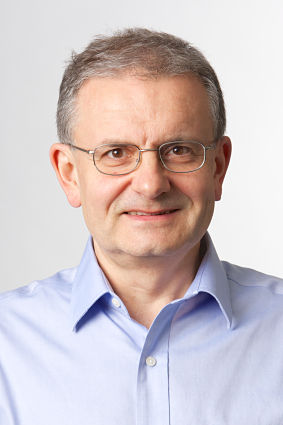Elek (neuroscience): my science career
I was born in Nagykorös, Hungary. My mother was an art teacher and my father was a sculptor and ceramicist. Pottery didn’t pay very well, so my father made money by restoring fireplaces and renovating the décor in historic buildings, but some of his sculptures are still on public display. I learnt his trade as a boy, which helped me earn money to support myself through university .
I studied medicine at the University of Szeged. You can do so many things with medicine: you can be a biophysicist, a medical chemist, a psychologist, a GP. I wanted to keep my options open. I chose Szeged partly because I had read a couple of books by Albert Szent-Györgyi, who used to work in the biochemistry department there and won a Nobel Prize for the discovery of vitamin C. One of the first things I did was to knock on the department’s door and ask if they had any projects I could help with. While this was an unusual request from a first-year medical student, they didn’t throw me out. They involved me in research projects and allowed me to run practical sessions and tutorials with students who were sometimes just a year younger than me. I spent all my spare time there. I enjoyed all aspects of medicine and graduated with the highest mark in my year.
My first job was as a research fellow in the biochemistry department in Szeged. I studied enzymes and membrane calcium pumps in muscle tissue. I also worked nights and weekends in a new stroke unit. It had no laboratory facilities during the night, so if I needed to make a diagnosis, I had to get a taxi to send the blood sample to a nearby hospital, where technicians would run the tests and phone with the results. It was a challenging job for a newly qualified medic.
I did my compulsory National Service in an aviation test centre of a military hospital, doing research into how muscles adapt to zero gravity.
Going to America was an exciting opportunity, but challenging too, especially after only seven weeks of learning English. Here I developed my research and by the time I left I was submitting research papers in English on the molecular properties of calcium pumps that regulate muscle contraction.
I missed the regime change in Hungary and the German unification. When I returned to Hungary it felt like a different country and it was exciting to see all the positive changes.
Something about English culture always appealed to me. I then took up a post at the MRC Neuropharmacology Unit in Oxford to do research into neurotransmitter receptors of the central nervous system. Before we moved to the new pharmacology department, the unit was housed in a temporary portakabin, so it wasn’t quite the Oxford I remembered.
I planned to return home eventually, so I tried to keep my Hungarian medical and research qualification current. This involved driving back to Hungary several times a year to take exams. My record was 24 hours from Oxford to Budapest. Life was so hectic that my wife and I had to arrange for our wedding to coincide with a trip back home for the public presentation and examination of my PhD thesis. My viva date changed three times and so did the date of the wedding.
I then went to Newcastle to establish my research group and to teach pharmacology to medical and science students. The teaching experience and successful research grant applications helped me to get a job at Bristol.
Bristol is such a stimulating environment. We have some outstanding neuroscientists engaged in interdisciplinary research. I try to use my medical background and experience in molecular neuroscience to bridge the gap between clinical and basic research – for example, in collaboration with clinicians, I’m currently investigating the molecular and cellular mechanisms involved in brain injury in preterm babies.
Extracts from a conversation with Hilary Brown (2009)

Other experiences
Be inspired by other staff stories.